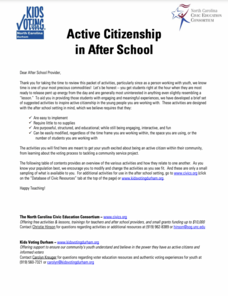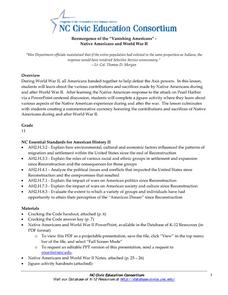Facing History and Ourselves
Community Is... Community Isn't
Scholars continue their exploration of the concept of community by first completing an anticipation guide and then engaging in a Four Corners activity to share their responses. They analyze an essay in which the author defines community...
Facing History and Ourselves
Making Meaning of Community
In the post-pandemic classroom, it's more important than ever to begin the school year by building a strong sense of trust and community. Using the Make Meaning and Big Paper teaching techniques, groups develop a definition of community...
Facing History and Ourselves
Our Names and Our Place in the World
Names come with all sorts of nuances and can influence how we see ourselves and how others see us. To gain insight into the power of names, class members journal about their names and then read a short essay about a girl and her feelings...
Facing History and Ourselves
Dual Identities
Many of us have multiple identities. There's who we are at home, school, friends, and strangers. And often these identities come with different names. The third activity in the First Days of School series examines how names reflect...
Facing History and Ourselves
What's In a Name?
Rumpelstiltskin understood the power of names. The second lesson in the First Days of School series focuses on building community by recognizing the importance of the relationships among names, identities, and cultures. Learners engage...
Carolina K-12
The Electoral College
Put the Electoral College into perspective with a simulation of an election. Scholars experience an electoral vote, participate in an in-depth discussion on the topic, and engage in a congressional committee where they learn about the...
Carolina K-12
Active Citizenship in After School
Active citizenship is the bedrock of any great democracy. Continue the trend by teaching the next generation about voting rights and the functions of elections in society. The variety of activities in the resource includes a human...
Carolina K-12
Early American Settlements
What brought settlers from Europe to North America? By exploring primary sources, such as posters seeking recruits for the new lands, class members take a deeper look at these motivations. To finish, they present their findings to...
Carolina K-12
Sample Test: The Judicial System
From Marbury v. Madison and original jurisdiction to Gideon v. Wainwright and civil appeal, here is a simple and comprehensive assessment on the judicial system of the United States.
Carolina K-12
Reemergence of the “Vanishing Americans” ‐ Native Americans and World War II
Discover the many contributions and sacrifices of Native Americans during World War II. After gaining background information through a detailed PowerPoint presentation and guided notes, your young historians will participate in a jigsaw...
Carolina K-12
Practice Test of Economics
From scarcity and supply and demand to entrepreneurship and the stock market, here you'll find a multiple-choice assessment that includes 34 questions covering all the major concepts of a traditional economics course.
Carolina K-12
Joe McCarthy and the Red Scare
In the 1950s, how did the Red Scare and the actions of Senator Joseph McCarthy affect the American people? Your young historians will analyze primary source documents on the Red Scare, participate in a "find the Communist" simulation,...
Carolina K-12
Sample Test: Economics
From scarcity and marginal benefits and costs to economic systems and GDP, this 22-question multiple choice test covers some of the most fundamental concepts of economics.
Carolina K-12
The Electoral College
Is the Electoral College the best method of electing the president of the United States? Your young historians will write a persuasive essay discussing the historical perspective of the college, pros and cons, and a final argument for or...
Carolina K-12
Create a City!
What is the purpose of a city charter? What services do local governments provide to their citizens? Is there an ideal way for citizens to behave? Approach these often overlooked yet important questions with your class members by having...
Carolina K-12
Learning About the Federal Budget: “Get a Pencil, You’re Tackling the Deficit!”
Your class members have been selected by the president to help solve the budget crisis as part of a special deficit commission. After learning about fiscal policy, economic theories, and the federal budget through a detailed PowerPoint...
National Endowment for the Humanities
Navigating Modernism with J. Alfred Prufrock
Learners explore the role of the individual in the modern world by closely reading and analyzing T.S. Eliot's "The Love Song of J. Alfred Prufrock."
A&E Television
Documenting Democracy: Lesson Plans on the United States Constitution
Balance and compromise. Class members come to understand the importance of these concepts as they investigate the concerns of the various stakeholders and how the format of the Constitution addressed these concerns.
Facing History and Ourselves
Identity Charts
Many factors shape the identity of persons, communities, and even nations. Tweens and teens have an opportunity to consider the many aspects of identity as they create a graphic that reflects who they are. Class members first brainstorm...
Facing History and Ourselves
Bio-poem: Connecting Identity and Poetry
Writing a bio-poem is a great way to have young scholars go below the surface and reflect on who or what has made them who they are. Check out this richly detailed lesson that provides step-by-step directions for crafting a bio-poem.
Albert Shanker Institute
Strategizing for Freedom
Booker T. Washington, W.E.B. DuBois, Marcus Garvey, and A. Philip Randolph developed different views on how to advance civil rights for African Americans. Class members research these famous figures and their strategies before developing...
Miama-Dade County Public Schools
African Americans and the Civil War
The American Civil War is the theme of this packet of materials prepared for Black History Month. Class members learn about the roles that African Americans played during the Civil War and examine the African-American experience after...
National First Ladies' Library
Women's Lives in the Victorian Era
The lives of middle-class Victorian women were circumscribed by strict standards that governed all aspects of behavior. To gain a better understanding of the Victorian Ideals for women, class members research the life of a middle-class...
Newseum
You Can’t Say That: Right to Know vs. Security Risk
Print or block? That is the question young journalists debate as part of their study of the freedom of the press. Half the class represents the journalists' legal team, and the other half represents the government's legal team. Teams...

























